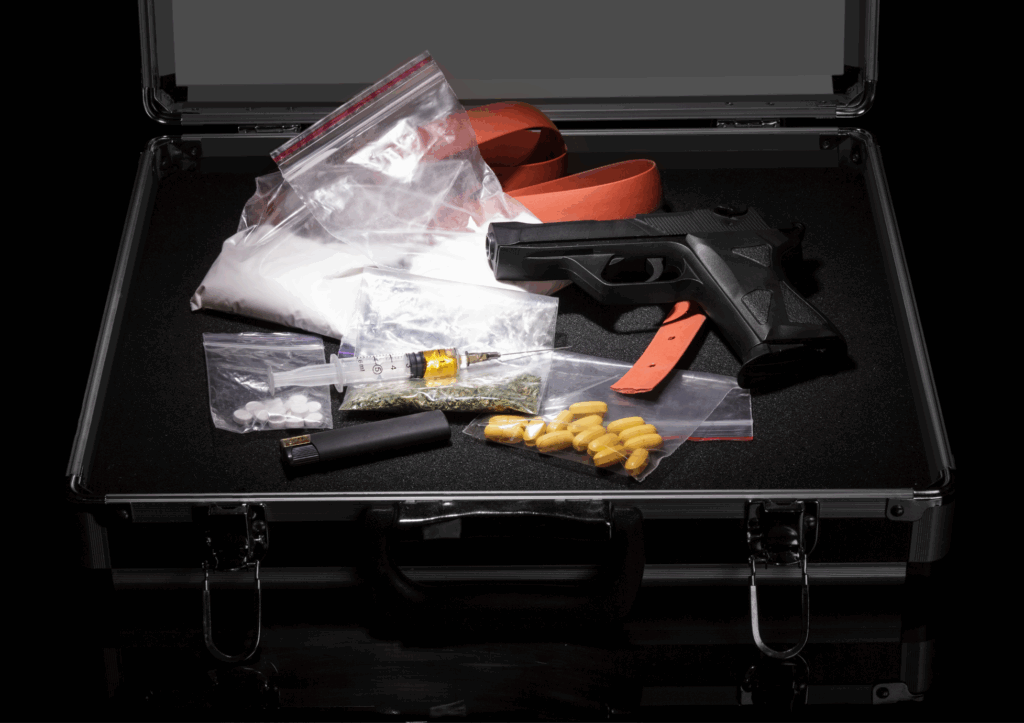Drug Enforcement Expert’s Testimony About the Firearm’s Purpose Admitted
Posted on April 25, 2025 by Expert Witness Profiler
Initially, based on information received from a confidential informant (CI), who indicated that Norvell Harris lived with Swanda Collins at 4469 Lake Fairway Drive in Lake Charles and stored a large amount of marijuana in nearby storage unit AA15, the Calcasieu Parish Sheriff’s Office (CPSO) initiated an investigation. Following this, detectives then conducted surveillance, observing Harris at the storage unit. Subsequently, a drug-sniffing canine was deployed, leading to a search of unit AA15.
This search revealed marijuana, heroin, fentanyl, cocaine, and a pistol. Consequently, following this discovery, officers obtained a second search warrant for 4469 Fairway Drive, Lake Charles, Louisiana, where they found two pounds of marijuana, MDMA doses, THC edibles, US currency, and ammunition.
However, Harris has not been charged with possession of the marijuana, MDMA, THC edibles and the ammunition found at the house, and the ammunition found at the house did not match the pistol found in the storage unit. Ultimately, Harris has been charged with possession to distribute heroin, fentanyl, and cocaine, and possession of a firearm in furtherance of a drug trafficking crime.
The government planned to present DEA Special Agent Chad Berard to testify that the pistol found in storage unit AA15 was used to further drug trafficking. Harris moved to exclude this testimony under Federal Rule of Evidence 702, arguing it was unhelpful, unreliable, and based on improper legal conclusions.

Drug Enforcement Expert Witness
DEA Special Agent Chad Berard has been with the Drug Enforcement Administration for twenty-six years. During his tenure with the DEA, Berard has been involved in hundreds of investigations of drug traffickers and drug trafficking organizations. He has conducted hundreds of interviews and thousands of hours of surveillance, listened to more than one hundred hours of phone calls related to investigations of drug traffickers, and has served as the case agent in over one hundred large scale drug trafficking investigations.
As a law enforcement agent, Beard has interviewed and recruited informants, obtained information about the means of distribution, the amounts and methods of drug distribution, and drug trafficking trends. He has participated in the execution of over one hundred search warrants of residences, stash houses, and other locations where illegal narcotics were found and seized, as well as tools used by distributors, manufacturers and users, such as scales, and drug ledgers.
Berard has also received training as a DEA Special Agent, attended sixteen (16) weeks of training at the DEA Academy, attended training on complex drug conspiracies, and receives weekly updates on drug trafficking trends ranging from money laundering methods to hidden compartments.
Discussion by the Court
Initial Arguments
Harris moved to exclude DEA Agent Chad Berard’s testimony. He argued that Berard’s proposed expert opinions under Federal Rule of Evidence 702 were unhelpful, unreliable, and were erroneous legal conclusions. Harris specifically contended that Berard’s opinions about the purpose of firearms in drug trafficking and whether the seized drugs were consistent with trafficking were improper statements on the ultimate legal issue and his guilt.
Analysis
A. Reliability
Regarding reliability, the Defendant challenged Special Agent Berard’s methods. Specifically, the Defendant contested Berard’s opinion that the amount and packaging of drugs found indicated drug trafficking and not personal use. However, the Court found that the Defendant did not demonstrate that Berard’s methods for reaching this conclusion were unreliable.
The Court viewed this opinion as permissible expert testimony. This view stemmed from Berard’s extensive experience over his 26-year career investigating numerous drug trafficking situations and his comparison of this case’s facts to observed patterns in similar situations.
B. Legal Conclusions
Harris argued that Berard’s opinions were improper legal conclusions that would mislead the jury. He specifically challenged opinions stating that drug traffickers use firearms for protection and to prevent theft. Harris also challenged the opinion that the pistol’s location near the narcotics suggested it was used to protect and further drug trafficking, not for a lawful purpose. The government admitted that directly stating the firearm “was in furtherance of drug trafficking” would be an improper legal conclusion.
The Court found that Berard’s opinions, as presented, did not cross the line into improper legal conclusions about Harris’ guilt. The Court viewed Berard’s statements as expert opinions based on his experience in hundreds of drug trafficking investigations. These opinions explained common practices within such operations.
The Court viewed Berard’s opinion about the proximity of the firearm to where the narcotics are located as a comparison to other narcotics investigations. This was meant to help the jury, not decide Harris’ guilt. The Court will provide the jury with the applicable law and any proposed limiting instructions, which will allow the jury to decide if Defendant is guilty of the indicted charges against him.
Held
The Court denied the Defendant’s motion to exclude the testimony of Chad Berard.
Key Takeaway:
Ultimately, the Court held that Berard’s opinions as to firearms possessed by drug traffickers and the firearm’s location and proximity to the narcotics were permissible expert opinions. Specifically, these opinions stemmed from Berard’s extensive experience as a Special DEA Agent. Furthermore, the Court clarified that these opinions were distinct from legal conclusions regarding the Defendant’s guilt or a misapplication of the law.
Case Details:
| Case Caption: | United States v. Harris |
| Doket Number: | 2:24-CR-00082-01 |
| Court: | United States District Court for the Western District of Louisiana, Lake Charles Division |
| Order Date: | April 21, 2025 |





